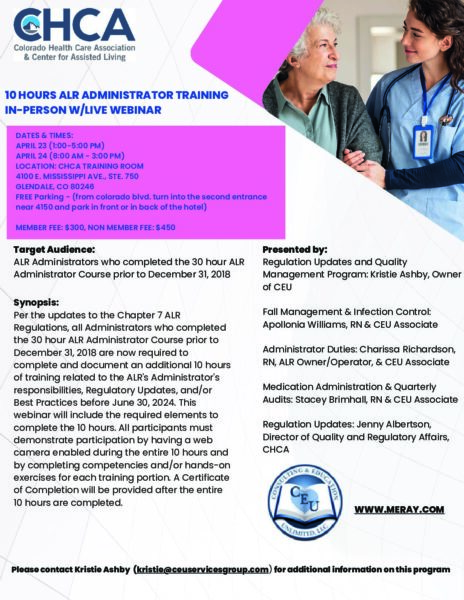30 Day Discharge Notices
From Fred Miles of GreenbergTraurig:
We recommend that a facility use its own form (preferably on letterhead) and personalize it to each individual situation.
CDPHE and CMS regulations permit a SNF to involuntarily discharge a resident only for different but specified reasons (they are not “exceptions” as the form states) that must be documented independently. These reasons are:
- The transfer or discharge is necessary to meet the resident’s welfare and the resident’s welfare cannot be met in the facility;
- The transfer or discharge is appropriate because the resident’s health has improved sufficiently so the resident no longer needs the services provided by the facility;
- The safety of other residents is endangered;
- The health of other residents is endangered;
- The resident has failed, after reasonable and appropriate notice, to pay for a stay at the facility
The regulations require that you give a resident 30 days advance written notice of transfer or discharge, unless the following emergency circumstances apply (in which case, you can discharge the resident on less than 30 days advance written notice):
- The safety of other residents is endangered;
- The health of other residents is endangered; or
- Immediate transfer or discharge is required because of the resident’s urgent medical needs.
As I stated, the ombudsman’s for is just a sample form—you are free to use your own template, but it must contain certain language required by CDPHE and CMS regulations, including:
1) The reason for the transfer or discharge,
2) The effective date of the transfer or discharge,
3) The location to which the resident is transferred or discharged,
4) The grievance procedure, and
5) The following text:
“You have a right to appeal the nursing care facility’s decision to transfer or discharge you. If you think you should not be transferred or discharged, you must appeal to _________ (staff designee) within 14 calendar days. If you do not wish to handle the appeal yourself, you may use an attorney, relative, or friend. If your appeal is not resolved to your satisfaction by the staff designee, you may appeal to the nursing care facility’s grievance committee within 10 calendar days of receipt of the decision of the staff designee. If your appeal is not resolved to your satisfaction by the nursing care facility’s grievance committee, you may appeal to the Executive Director of the Colorado Department of Public Health and Environment within 10 calendar days of receipt of the grievance committee decision. If you are not satisfied with the Executive Director’s decision, you have 30 calendar days to request that the Department of Public Health and Environment set the matter for an administrative hearing. You may direct questions regarding this notice to the Department of Public Health and Environment at____________________(division name, address and phone number).”
Nursing care facilities that are certified for Medicaid and/or Medicare reimbursement, must also add the following statement: “In addition, if you have questions or complaints about the transfer or discharge or would like help to appeal, call or write the state and local Long-Term Care Ombudsman at ___________(phone numbers/addresses).”
If the resident who is being involuntarily transferred is a person with a developmental disability for whom an agency has been authorized by law as the agency responsible for advocacy and protection of the rights of persons with developmental disabilities, the nursing care facility must also include an additional advisement in the notice of discharge which I will not repeat here.
Also, In cases where a resident is being involuntarily transferred or discharged from a nursing care facility that is certified to participate in the Medicaid and/or Medicare reimbursement program, a copy of the written notice (including the grievance and appeal rights, and current contact information for the state and local Long-Term Care Ombudsman) shall also be sent to the state and local Long-Term Care Ombudsman at the same time it is sent to the resident or as soon as the determination is made that the transfer or discharge is involuntary.
The resident cannot be involuntarily discharged, transferred, or moved to another room within the facility until:
- The facility notice period expires (i.e., 30 days, unless one of the three emergency circumstances listed above);
- The time for filing a grievance or appeal has expired (unless one of the three emergency circumstances listed above); or
- If a grievance or appeal is filed, until the grievance or appeal has been resolved.
![Colorado Health Care Association [logo]](https://www.cohca.org/wp-content/themes/cohca/images/logo.png)









